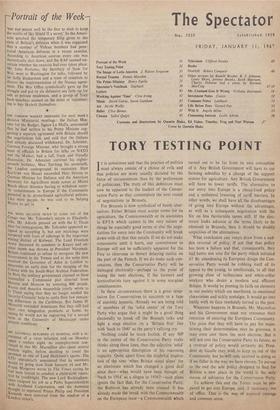TORY TESTING POINT
I'r is sometimes said that the practice of politics must always consist of a choice of evils and that policies are more usually dictated by the force of circumstances than by the preferences of politicians. The truth of this definition must now be apparent to the leaders of the Conser- vative Party as they contemplate the next round of negotiations in Brussels.
For Brussels is now symbolical of harsh alter- natives. Either Britain must accept terms for its agriculture, the Commonwealth or its associates in EFTA which cannot in the very nature of things be especially good terms or else the nego- tiations for entry into the Community will break down with all that that entails. If we do not make concessions until it hurts, our commitment to Europe will not be sufficiently apparent for the Five to intervene to thwart delaying tactics on the part of the French. If we do make such con- cessions, then the Conservative Party will be damaged electorally—perhaps to the point of losing the next elections, if the farmers and horticulturists turn against it in some marginal constituencies.
In these circumstances there is a great temp- tation for Conservatives to succumb to a type of atavistic hysteria. 'Already we are being told of members of the 'solid centre' of the Tory Party who argue that it might be a good thing electorally to break off the Brussels talks and fight a snap election on a 'Britain first' line with 'back to 1940' as the party's rallying cry.
Nothing could be more foolish. If any MP in the centre of the Conservative Party really thinks along these lines, then the adjective 'solid' is an appropriate description of his reasoning capacity. Quite apart from the doubtful inspira- tioti of the time 'when Britain stood alone' for an electorate which has changed a good deal since then—what would have been thought of 'back to 1914' as a slogan in 1936?—such plans ignore the fact that, for the Conservative Party, the Rubicon has already been crossed. It has already made the break with the Commonwealth on the European issue—a Commonwealth which turned out to be far from its own conception Of it. Any British Government will have to cut farming subsidies by a change of the support system for agriculture. Any British Government will have to lower tariffs. The alternative to our entry into Europe is a cheap-food policy and a unilateral lowering of tariff barriers. In other words, we shall have all the disadvantages of going into Europe without the advantages, as well as a subsequent negotiation with the Six on less favourable terms still. If the elec- torate looks askance at the terms likely to be obtained in Brussels, then it should be doubly suspicious of the alternatives.
What conclusion can voters draw from a sud- den reversal of policy, if not that that policy has been a failure and that, consequently, they had better not vote for the party which initiated it? By abandoning its European design the Con- servative Party would be robbing itself of its appeal to the young, to intellectuals, to all that growing class of technicians and white-collar workers who desire a modern and efficient Britain. It would be pinning its faith on elements in our society which are moribund, to emotional chauvinism and 'sickly nostalgia. It would go into battle with its face resolutely turned to the past.
Whatever happens in Brussels, Mr. Macmillan and his Government must not renounce their intention of entering the European Community. The price that they will have to pay for main- taining their determination may be grievous, it may even cost them the next election. But it will not cost the Conservative Party its future, as a reversal of policy would certainly do. Presi- dent de Gaulle may wish to keep us out of the Community, but he will only succeed in doing so if we falter in the way we have chosen. To pursue to the end the sole policy designed to find for Britain a new place in the world is the only means of salvation for the Conservative Party.
To achieve this end the Tories must be pre- pared to get into Europe, and, if necessary, out of office. That is the way of political courage and common sense.






























 Previous page
Previous page